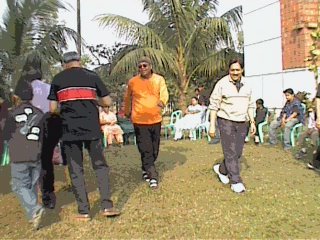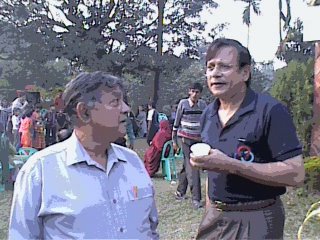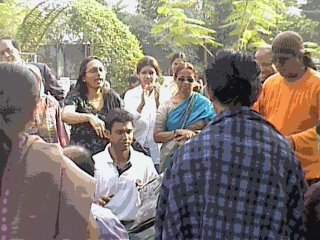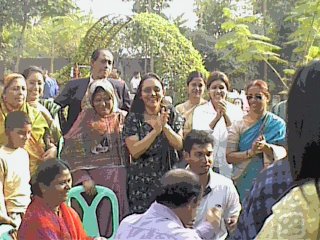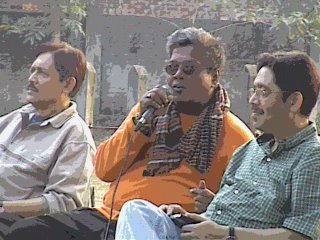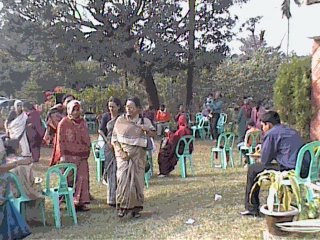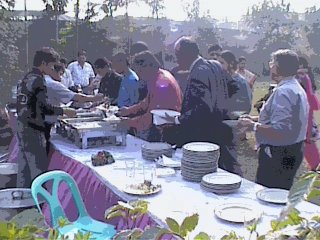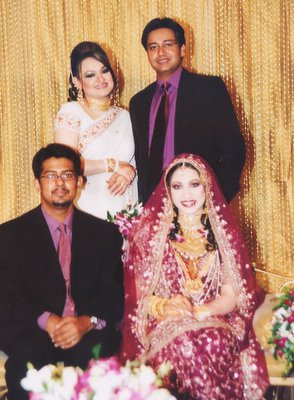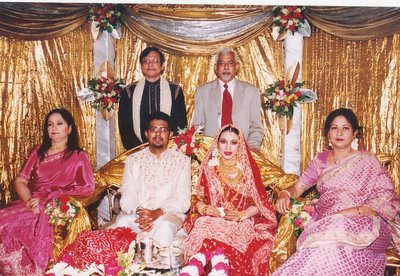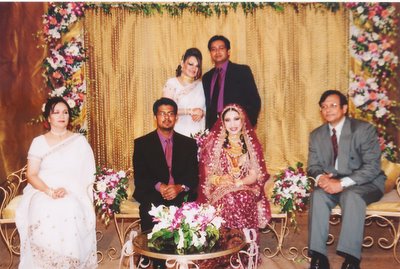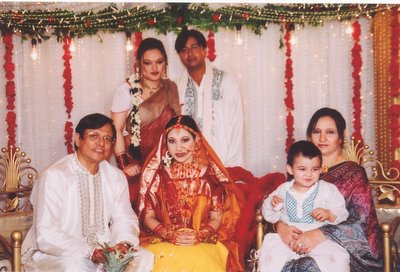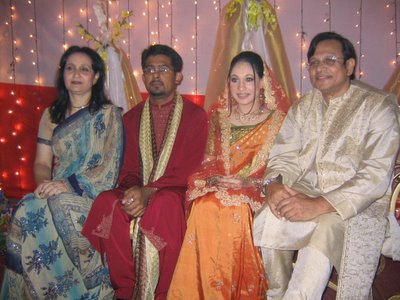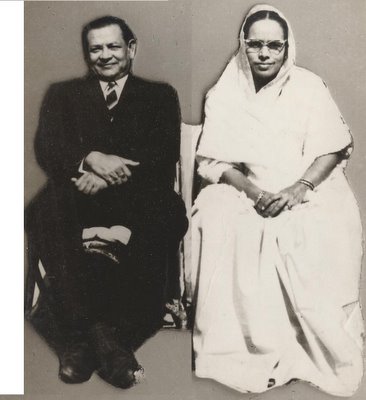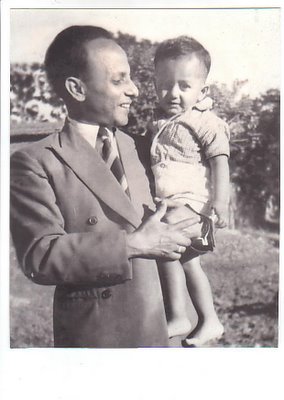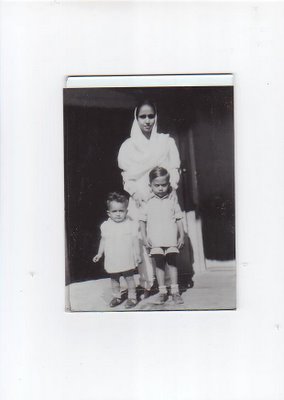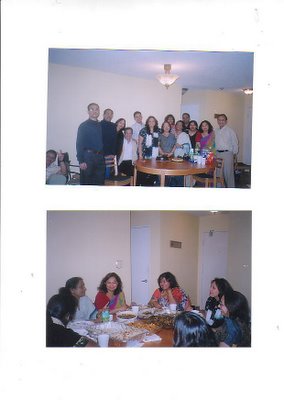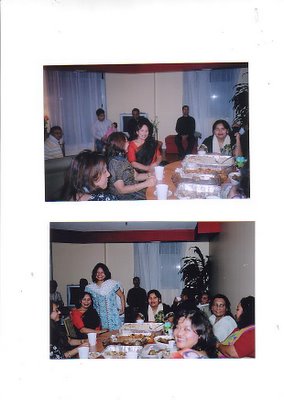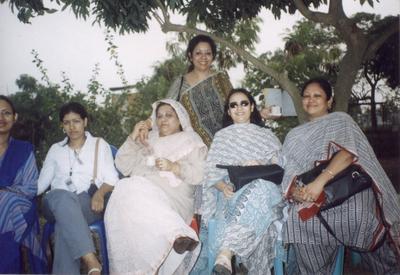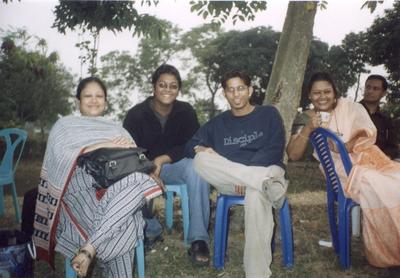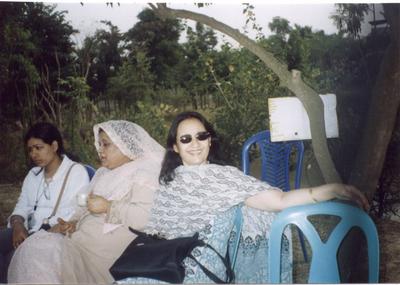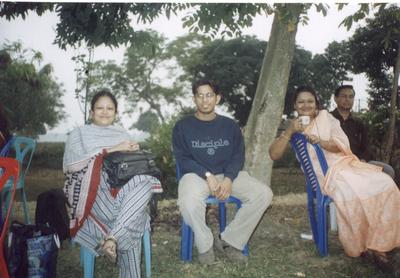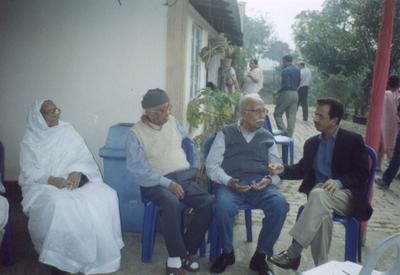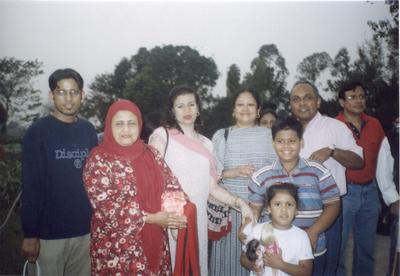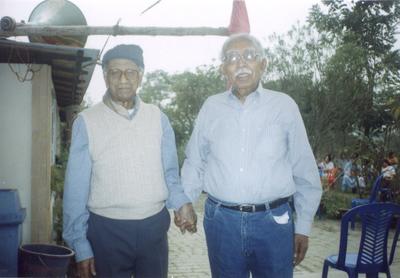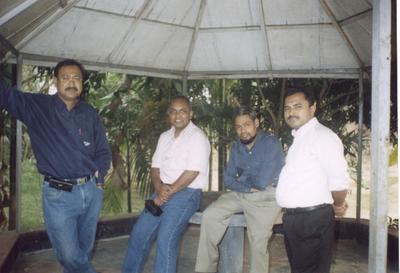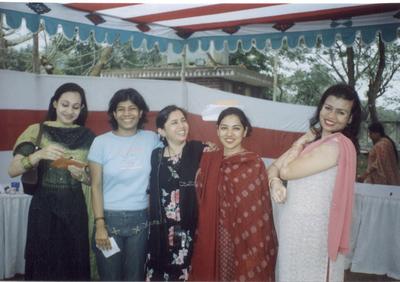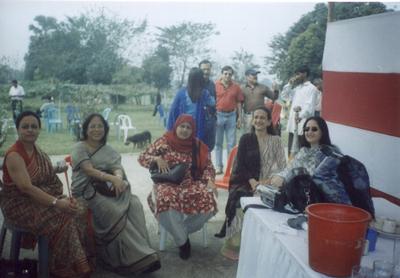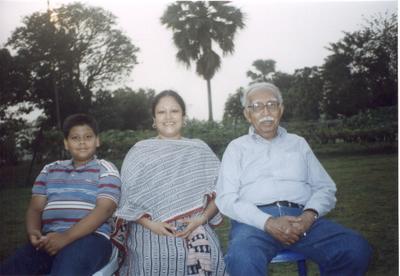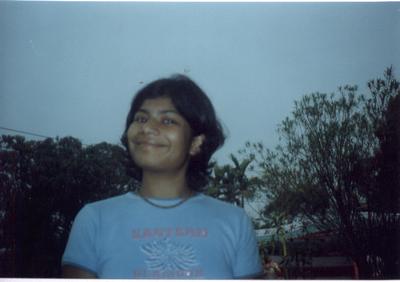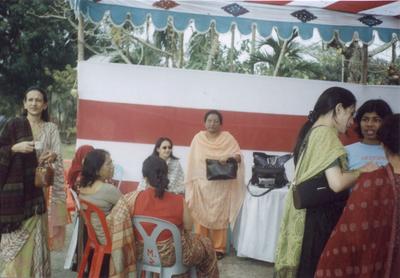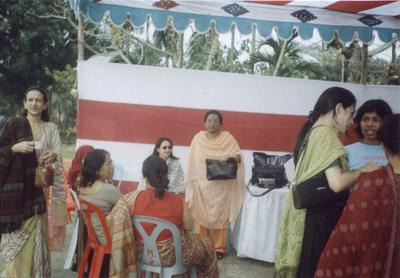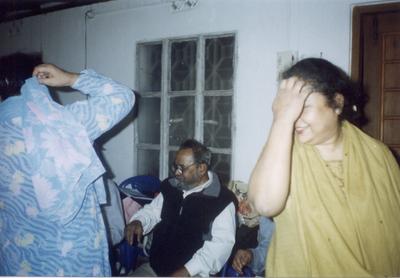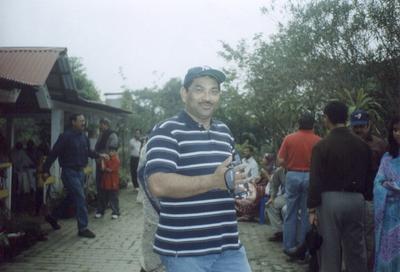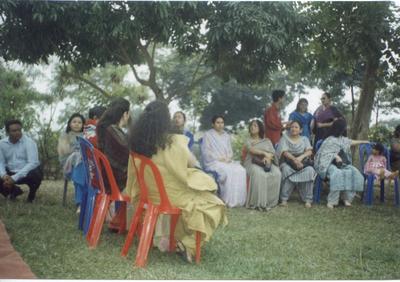Tuesday, June 28, 2011
Tuesday, February 07, 2006
Lahey-Lahey Picnic - 6th January 2006 - Sayeed kas lens - 2
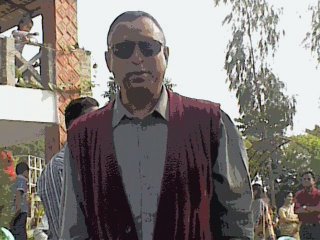 The Best Dressed Axomiya of the Day: His suave and manners nothwithstanding I think the pictures Sayeed ka sent and ones you are viewing has a surreal feel to it!
The Best Dressed Axomiya of the Day: His suave and manners nothwithstanding I think the pictures Sayeed ka sent and ones you are viewing has a surreal feel to it!Here is what he has to say about his work:
So here they are, for what its worth. Because as you will see that they did'nt come out well. It at least proves that I am not a great photographer. Evidently I did'nt set the digital camera in the correct way, unfortunately. If you decide not upload them to the website, that's all right. I will understand-- and maybe make me resolve to do a better job next time around. Lets hope the others who had their cameras that day, have some better photographs, and put them on the web even with some more lahey lahey.
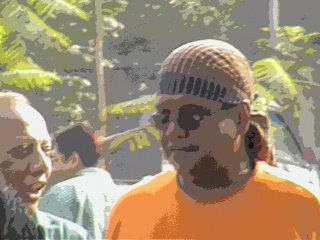 Shall We Bihu?: Pulen ka coaxing me to 'get into action' - for once nobody asked me why I wear a 'gamcha' on my head, which was very reassuring! I love the 'poster' effct in this image.
Shall We Bihu?: Pulen ka coaxing me to 'get into action' - for once nobody asked me why I wear a 'gamcha' on my head, which was very reassuring! I love the 'poster' effct in this image.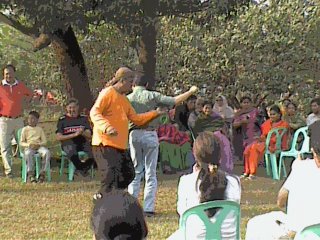 Amar Bihut Amoni Nai: Self left and Wazir Ka 'get into action' and sure enough.......
Amar Bihut Amoni Nai: Self left and Wazir Ka 'get into action' and sure enough.......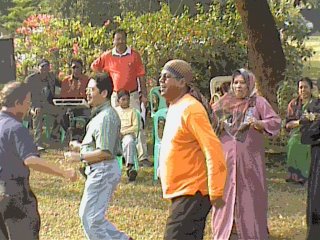 .....we have Bhonty baity 'leading the charge' of ladies -- I am sure we will have some more pix of who else joined in the 'kokal hiluwa'
.....we have Bhonty baity 'leading the charge' of ladies -- I am sure we will have some more pix of who else joined in the 'kokal hiluwa'Lahey-Lahey Picnic - 6th January 2006 - Sayeed kas lens - 1
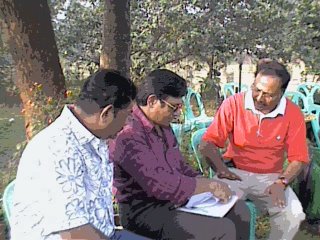 Logistic Nightmares: (LTR) Selim, Mahmood ka (Dangka) and Tanvir (Tannu) sorting out the hiccups that came along -- for one we were without electricity for 2 and half hours. Its the only time in the picnic that Dangka 'visibly' panicked!
Logistic Nightmares: (LTR) Selim, Mahmood ka (Dangka) and Tanvir (Tannu) sorting out the hiccups that came along -- for one we were without electricity for 2 and half hours. Its the only time in the picnic that Dangka 'visibly' panicked! Heat of Battle: The Axomiya language test for spouses. Notice the seriousness in Ela bhabi's (3R) face and Labloo (4R) with his 'must win' look!
Heat of Battle: The Axomiya language test for spouses. Notice the seriousness in Ela bhabi's (3R) face and Labloo (4R) with his 'must win' look!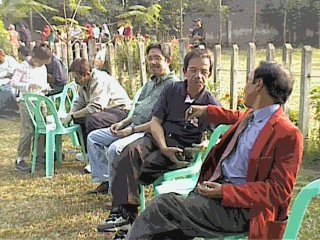 Early Hours: Hasan ka busy making a point, Wazir ka smugs for the camera, while Akhter ka busy signing autographs for his granchildren!
Early Hours: Hasan ka busy making a point, Wazir ka smugs for the camera, while Akhter ka busy signing autographs for his granchildren!Sunday, January 22, 2006
Saturday, January 21, 2006
Monday, January 16, 2006
Me and Dio in a while
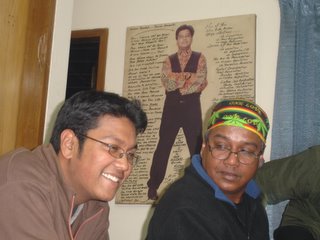
Hi Everybody,
Just wanted to share a photograph taken this evening with Dio, an evening like most evenings and we had some musician friends over... lot's of singing. There was even a guest from London.
The ownership of the "One Love" bandanna on my head is suspect.....I found it in a pile of old clothes in the house. Now Dio claims it is his, but has no verifiable proof, neither have I seen it on his head EVER!
So for the time being -- it looks far too pretty to loose, and I am kinda 'hanging on' to it. Dio is nonetheless spreading rumours that I have 'stolen it' from him !
In the website click on the image for a larger view.
Cheerio!
Friday, January 13, 2006
Extension of Dreams: My father Sona and Uncle Ansari
.jpg) This picture appeared in Assam Tribune on 1st March 1945 after Abba was decorated for valor in his action against the Burmese in Akyab
This picture appeared in Assam Tribune on 1st March 1945 after Abba was decorated for valor in his action against the Burmese in AkyabBy Maqsoodul Haque (Mac)
A fair assessment of my father Abu Nasser Ziaul Haque Sona – would be of a real life ‘tragic hero’ that Allah in his infinite Mercy and wisdom has honored me to be a son to. He was a man among men who would be the guiding force of my destiny.
The life I have chosen for myself, meandering, wavering, never-perfect and troublesome to many as may be – as I write, let me be forthright and admit that there is never a moment I live, without his over enveloping memory: that of a forever affable, outspoken and frank to a fault human being – who had NO absolute monopoly on virtues – just like all of us!
What will however never elude me is a realization that I am in a round about way the ‘millennium public eyes’ of dreams he had, of predictions he made – and of a world he taught me would be much harder to live and fight a ‘piece of the pie’ for in the days ahead.
He had prepared me for this day, and prepared me to be in the ‘public eye’, a much larger eye than one that our small yet lovable Auhomia community in Bangladesh may imagine. I live on (48 pushing 49) as a ‘continuation of his human vision’ – the fight goes on - much as I see the extension of both our collective dreams in my only son, friend and now comrade, Abu Saeed Shafiul Haque Dio – Sona’s talented grandson.
Father initially discouraged me from music because he was afraid I would not finish my education. He was more than keen to see me through University. If I had chosen to drop off and hadn’t finished graduation, he would have died a very unhappy man – let us not forget that he was not entirely proud of his own CV. He was a Matriculate, and it was only natural that he looked at my Graduation from an University as an extension of his dreams.
Assured that I wouldn’t let down his dream (i.e. my Graduation) he let me be, and I even surprised him in 1977 by receiving a grant to study Political Science at the University of Rochester in the US, while I was a second year student in Notre Dame College, Dhaka. While he could easily afford to pay for my tuition and the airfare and infact signed the consent form, yet his somber request a day later that he would live a ‘couple of more years’ if I did not leave him, made me trash all documents and decide to stay back. Yes, all my college friends left for the US or Canada, but I stayed on and there is absolutely no regret.
Father as he would say later in life, ‘received an extension’ for my not going away. Can a son ask for a bigger compliment? He loved me too dearly, and knew without me he would die, and so I went on to become a musician, a business executive, a socio-cultural-political activist, a hobbyist philosopher, a writer, journalist among others.
He taught me to love nature and its ‘best creation’ man, with the poorest of the poor being the focus of his undivided attention. He reminded me that it was in the tradition of the Haque’s, the children of Paziruddin Ahmed the Judge, that it would stand by for service to the poor – imprtantly -- service to the nation. My Grandfather opted for the Bengal Judicial Service (and thus our association with Bengal) for no other reason, but because Muslims in Sandwip, where he was the first Munsif, were an oppressed lot.
It was for the service to the nation that Sona went to the Second World War at age 16 (there weren’t such things as ‘child soldier’ those days!) as an ordinary Boy Petty Officer and saw death and action up close. During the War after an action in Akiyab against the Japanese he was decorated for bravery and his picture appeared in an Assamese English language daily. It remains to date my most precious possession.
His younger brother by a year and one day Abu Taher Khairul Haque Ansari, also went to War initially in the Air force and later in the Army and he was the one who encouraged me the most to sing – predicting to my father that I would be ‘among the very best’ if I were to take music as a profession – in those days an ‘unheard of’ or ‘destitute like’ profession to be in!! Ansari was the most accomplished singer that I have ever had the fortune to meet, and he, like me was musically illiterate i.e. – he could never play any instruments, except one sent by gOd, his voice.
He taught me two songs one from Saigal “Ei dil mujhe asi jagay ley chal jaha koiee na ho”– and Bhupen’s “Mitha mitha bohagor, geet e tikay rosu buli bhabilu” – and I in turn taught him Ahmed Rushdies “Co-Co Corina” which we would sing in chorus in our evening drives in Rangoon.
Back to Father, despite the fact that I was an only son, he kept me under his strictest supervision (his favorite quote ‘Spare the Rod, Spoil the Child’ still gives me the chills), and thrashed me mercilessly whenever I lied, teaching me ‘tell one lie boy, and you end up telling 200 lies to cover up just that first one’.
He had, what was once described by my youngest uncle Abu Saeed Shamsul Haque Babu as a ‘notoriously fearful temper’— and it was dear Millie Baity and Nellie Baity who would rush to our house in the same building where we lived, to rescue me – when his ‘kaan tolia sor’ (box to the ear) beatings would send my howls reverberating all across Ajmeri Manzil in Amlapara, Narayangunj, where I was born.
No folks my father was no Saint. Yes I was an abused child, beaten silly even when I was not at fault, unable to tell the TRUTH as he had taught me to – because I could see that I was been beaten on assumption of an information he had received, which itself was a LIE.
However I would even at that very tender age appreciate that in his beatings he was being ‘merciful’ for I also remember times he would make up to me. Realizing that he had beaten me up for the wrong reasons, he would tell me stories of his childhood and how he was treated as an orphan.
Among the most poignant moment I spent with him, was holding him tight as he sobbed worse than me, narrating stories of how he at age 10, having lost both parents, would go without meals just to make sure his younger brothers Ansari and Babu didn’t go hungry. These stories and others would feature in the Unpublished Diary of Ansari that I have decided to type out laboriously each day and send and share with you. Stay tuned.
If asked honestly all of us Haque’s have several unabated blemishes in our traits. We make hasty decisions, are highly opinionated and judgmental, yet on the flip side when pointed out in ‘clear and no nonsense terms’ that we have been DEAD WRONG, have also the sagacity to apologize, no matter whosoever we have erred. I see this trait so much in Mahmood (Dangka) these days, that it sometimes embarrasses me. He after all is one epitome of what a Haque man ought to be – and ME, his most ‘colourful’ an eccentric–by-choice opposite!
It was Ansari’s death under mysterious circumstances in Rangoon that completely shattered Sona and he was overnight transformed and devastated. For the Haque Ansari’s death was monumental as it was to be the first death in what we term ‘our first generation’.
Ansari died at the peak of his glory, the highest decorated Bengali Officer, a war hero of 1965, a man the whole world was looking up to. His next posting was to be as General Officer Commanding (GOC) of the Pakistan Army here in Dhaka, when it was turn for our Maker to order his return from where he came.
Extension of Dreams take a new dimension when you juxtapose time and space, between NOW and THEN.
In 1987, I turned 30, and was on the verge of releasing my first Bengali album with my erstwhile band FEEDBACK. Father would listen to all the songs everyday, would have some sarcastic comments on some and was uplifted by others – also predicted that I would be singing Bengali songs all my life, and approved of the Cover Inlay, yet 2 months prior to its release, he too was hastily asked by his Maker to return to where he came from.
The album ‘Ullassh’ went on to become history and is entering its 20th year next year, when it will be considered a classic. My Dad did not live to see that day, but luckily I have seen the extension of his dream.
In July 2005, a week after his 20th Birthday, Dio and his band “Nemesis” released their first album “Onneshon” (closest English translation - the Search). My son is an Undergrad at the Independent University in Bangladesh, a Rock Star who is lot busier than me, at 6 feet 2 inches the tallest drummer in Bangladesh!
On 9th January 2006, Dio did me a huge favour – he played drums in one of my recent recordings and we jointly see a music future – of course as a musician I completely surrender to his talents.
He has after all beaten me by 10 years with a debut album.
A fair assessment of my father Abu Nasser Ziaul Haque Sona – would be of a real life ‘tragic hero’ that Allah in his infinite Mercy and wisdom has honored me to be a son to. He was a man among men who would be the guiding force of my destiny.
The life I have chosen for myself, meandering, wavering, never-perfect and troublesome to many as may be – as I write, let me be forthright and admit that there is never a moment I live, without his over enveloping memory: that of a forever affable, outspoken and frank to a fault human being – who had NO absolute monopoly on virtues – just like all of us!
What will however never elude me is a realization that I am in a round about way the ‘millennium public eyes’ of dreams he had, of predictions he made – and of a world he taught me would be much harder to live and fight a ‘piece of the pie’ for in the days ahead.
He had prepared me for this day, and prepared me to be in the ‘public eye’, a much larger eye than one that our small yet lovable Auhomia community in Bangladesh may imagine. I live on (48 pushing 49) as a ‘continuation of his human vision’ – the fight goes on - much as I see the extension of both our collective dreams in my only son, friend and now comrade, Abu Saeed Shafiul Haque Dio – Sona’s talented grandson.
Father initially discouraged me from music because he was afraid I would not finish my education. He was more than keen to see me through University. If I had chosen to drop off and hadn’t finished graduation, he would have died a very unhappy man – let us not forget that he was not entirely proud of his own CV. He was a Matriculate, and it was only natural that he looked at my Graduation from an University as an extension of his dreams.
Assured that I wouldn’t let down his dream (i.e. my Graduation) he let me be, and I even surprised him in 1977 by receiving a grant to study Political Science at the University of Rochester in the US, while I was a second year student in Notre Dame College, Dhaka. While he could easily afford to pay for my tuition and the airfare and infact signed the consent form, yet his somber request a day later that he would live a ‘couple of more years’ if I did not leave him, made me trash all documents and decide to stay back. Yes, all my college friends left for the US or Canada, but I stayed on and there is absolutely no regret.
Father as he would say later in life, ‘received an extension’ for my not going away. Can a son ask for a bigger compliment? He loved me too dearly, and knew without me he would die, and so I went on to become a musician, a business executive, a socio-cultural-political activist, a hobbyist philosopher, a writer, journalist among others.
He taught me to love nature and its ‘best creation’ man, with the poorest of the poor being the focus of his undivided attention. He reminded me that it was in the tradition of the Haque’s, the children of Paziruddin Ahmed the Judge, that it would stand by for service to the poor – imprtantly -- service to the nation. My Grandfather opted for the Bengal Judicial Service (and thus our association with Bengal) for no other reason, but because Muslims in Sandwip, where he was the first Munsif, were an oppressed lot.
It was for the service to the nation that Sona went to the Second World War at age 16 (there weren’t such things as ‘child soldier’ those days!) as an ordinary Boy Petty Officer and saw death and action up close. During the War after an action in Akiyab against the Japanese he was decorated for bravery and his picture appeared in an Assamese English language daily. It remains to date my most precious possession.
His younger brother by a year and one day Abu Taher Khairul Haque Ansari, also went to War initially in the Air force and later in the Army and he was the one who encouraged me the most to sing – predicting to my father that I would be ‘among the very best’ if I were to take music as a profession – in those days an ‘unheard of’ or ‘destitute like’ profession to be in!! Ansari was the most accomplished singer that I have ever had the fortune to meet, and he, like me was musically illiterate i.e. – he could never play any instruments, except one sent by gOd, his voice.
He taught me two songs one from Saigal “Ei dil mujhe asi jagay ley chal jaha koiee na ho”– and Bhupen’s “Mitha mitha bohagor, geet e tikay rosu buli bhabilu” – and I in turn taught him Ahmed Rushdies “Co-Co Corina” which we would sing in chorus in our evening drives in Rangoon.
Back to Father, despite the fact that I was an only son, he kept me under his strictest supervision (his favorite quote ‘Spare the Rod, Spoil the Child’ still gives me the chills), and thrashed me mercilessly whenever I lied, teaching me ‘tell one lie boy, and you end up telling 200 lies to cover up just that first one’.
He had, what was once described by my youngest uncle Abu Saeed Shamsul Haque Babu as a ‘notoriously fearful temper’— and it was dear Millie Baity and Nellie Baity who would rush to our house in the same building where we lived, to rescue me – when his ‘kaan tolia sor’ (box to the ear) beatings would send my howls reverberating all across Ajmeri Manzil in Amlapara, Narayangunj, where I was born.
No folks my father was no Saint. Yes I was an abused child, beaten silly even when I was not at fault, unable to tell the TRUTH as he had taught me to – because I could see that I was been beaten on assumption of an information he had received, which itself was a LIE.
However I would even at that very tender age appreciate that in his beatings he was being ‘merciful’ for I also remember times he would make up to me. Realizing that he had beaten me up for the wrong reasons, he would tell me stories of his childhood and how he was treated as an orphan.
Among the most poignant moment I spent with him, was holding him tight as he sobbed worse than me, narrating stories of how he at age 10, having lost both parents, would go without meals just to make sure his younger brothers Ansari and Babu didn’t go hungry. These stories and others would feature in the Unpublished Diary of Ansari that I have decided to type out laboriously each day and send and share with you. Stay tuned.
If asked honestly all of us Haque’s have several unabated blemishes in our traits. We make hasty decisions, are highly opinionated and judgmental, yet on the flip side when pointed out in ‘clear and no nonsense terms’ that we have been DEAD WRONG, have also the sagacity to apologize, no matter whosoever we have erred. I see this trait so much in Mahmood (Dangka) these days, that it sometimes embarrasses me. He after all is one epitome of what a Haque man ought to be – and ME, his most ‘colourful’ an eccentric–by-choice opposite!
It was Ansari’s death under mysterious circumstances in Rangoon that completely shattered Sona and he was overnight transformed and devastated. For the Haque Ansari’s death was monumental as it was to be the first death in what we term ‘our first generation’.
Ansari died at the peak of his glory, the highest decorated Bengali Officer, a war hero of 1965, a man the whole world was looking up to. His next posting was to be as General Officer Commanding (GOC) of the Pakistan Army here in Dhaka, when it was turn for our Maker to order his return from where he came.
Extension of Dreams take a new dimension when you juxtapose time and space, between NOW and THEN.
In 1987, I turned 30, and was on the verge of releasing my first Bengali album with my erstwhile band FEEDBACK. Father would listen to all the songs everyday, would have some sarcastic comments on some and was uplifted by others – also predicted that I would be singing Bengali songs all my life, and approved of the Cover Inlay, yet 2 months prior to its release, he too was hastily asked by his Maker to return to where he came from.
The album ‘Ullassh’ went on to become history and is entering its 20th year next year, when it will be considered a classic. My Dad did not live to see that day, but luckily I have seen the extension of his dream.
In July 2005, a week after his 20th Birthday, Dio and his band “Nemesis” released their first album “Onneshon” (closest English translation - the Search). My son is an Undergrad at the Independent University in Bangladesh, a Rock Star who is lot busier than me, at 6 feet 2 inches the tallest drummer in Bangladesh!
On 9th January 2006, Dio did me a huge favour – he played drums in one of my recent recordings and we jointly see a music future – of course as a musician I completely surrender to his talents.
He has after all beaten me by 10 years with a debut album.
Sunday, January 08, 2006
OSSGA - 2006 ( Out Standing Service to the Group Award )
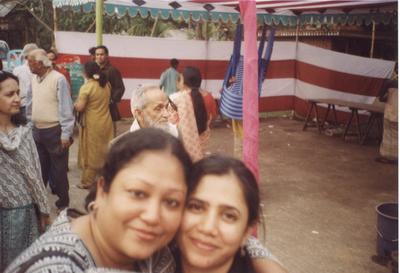 Rimi our OSSGA 2006 Award Winner is seen on the right with Mac's wife Niboo in the picnic last year. Niboo passed away 2 months after the picnic. Both were great friends.
Rimi our OSSGA 2006 Award Winner is seen on the right with Mac's wife Niboo in the picnic last year. Niboo passed away 2 months after the picnic. Both were great friends.In order to recognise the voluntary efforts given by some members for the greater interest and benefit of the group and to encourage others to come forward with similar efforts it was agreed that an award would be given to individuals periodically on similar gatherings of the Group.
For pioneering the formation of the Group Forum, as it stands today, which has brought our small community in touch with each other and in recognition of her outstanding contribution to the Auhomia Community by her sincere devotion to the group’s activities in spite of the adversities faced by her due to her husband’s health and his impending kidney transplantation, the Organisers of the Auhomia Picnic 2006 has nominated and awarded the OSSGA AWARD 2006 to the ever smiling RIMI, wife of our dear Bhaity who also shares a large portion of the award. The award was sponsored this year by Akhter ka with Gift Hamper worth Tk. 3,000.00 from store “Etc.” and was handed over by him formally to Nilu in the absence of Rimi & Bhaity on the occasion.
Submitted by Mahmood ka
Thursday, January 05, 2006
Tuesday, January 03, 2006
Friday, December 30, 2005
Wednesday, December 28, 2005
TODAY WE REMEMBER…..Abul Kasem Fazlul Haque Hoonti
By Md.Mahmoodul Haque
On this day the 28th of December 1912 my father late Mr. Abul Kasem Fazlul Haque better known as “Hoonti” was born at Jorhat. He was the second son of Paziruddin Ahmed, M.A., B.L. (LL.B.) and Amina Ahmed at ‘Roza Bari,’ Jorhat, Assam. Late Paziruddin Ahmed was in the Bengal Civil Service (Judicial) and was lastly posted at Howrah as District Judge.
Mr. Ahmed was posted in almost all over East Bengal (now Bangladesh), so Hoonti had to move with his father to places like Netrokona, Rajbari, Sandwip Island, Patiya, etc. His mother died when he was only 7-8 years old in 1920 at Rajbari. In 1932 he passed his Matriculation examinations from Cargil High School, Sandwip. Soon after he joined the Jamalpur Engineering Institute in Bihar. He obtained degrees in both Electrical and Mechanical Engineering and joined the East Indian Railway and was posted at Liluah near Calcutta.
He was there till 1934 and because of his pro-Muslim stand he quit the railway and joined the Adamjee Gold Mining Company at Mysera in Bihar and was there till 1946. He then left for Jorhat, Assam and started a workshop there. He stayed back after partition of India but left for erstwhile East Pakistan when he sensed that the Chief Minister of Assam Mr. Gopinath Bordoloi was spying on him because his younger brother Ansari was serving the Pakistan army.
Hoonti migrated to East Pakistan, now Bangladesh in July 1951 with his wife, two daughters and a son. He joined the Zareen Jute Baling of the Ispahani Group at Narayangunj as an Engineer. In 1958 he left his services as a Chief Engineer of Ispahani Group of Jute Mills and started his own boat building and metal works industry at Narayangunj.
On 18th May 1963 morning he suffered a heart attack and was confined to bed for about a year. In those days heart attacks were unknown and as we had many visitors at our house we were forced to display the ‘no visitor’ sign at our door. When the Liberation War started in March 1971 his business started to collapse. From 1972 till he left for his eternal resting place in Allah’s cradle on the evening of 19th February 1980, Hoonti lead a retired life.
Earlier, in 1939 he married his second cousin Mahmuda Khatun, better known as 'Makhan Bou' and was blessed with 3 daughters- Mili, Neli and Eli and 2 sons – Mahmood and Mahboob.
Mili, his eldest daughter married Capt Azizur Rahman, an international commercial pilot and now retired and living in Delaware, USA. Mili has four sons, Salim, Mafooz, Reaz and Babu.
Salim, a businessman himself is married to Jhunu, daughter of a very successful businessman. Salim has two sons, Zarif 7 and Zafir 5 and lives in Gulshan, Dhaka.
Mili’s second son Mafooz married Saadma daughter of a retired Insurance company’s MD. Mafooz is blessed with a daughter Arifa 7 and a son Amir 4 and are currently in Gulshan, Dhaka.
Mili’s third son Reaz, a computer Engineer is married to Razzel daughter of a doctor from Rajasthan, India. They have two daughters Anusha 6 and Tisha 2 and live in Virginia, USA.
Mili’s youngest son Babu, recently married Shabnam, daughter of Bibul from Borhulla, Assam. They are in Gulshan, Dhaka and waiting for their visa to join Babu’s parents in the USA.
Hoonti’s second daughter Neli married Mr. Khawaja Gulam Sarwar, a civil servant who has retired as Member Customs, Board of Revenue of Bangladesh and lives in Baridhara, Dhaka.
Neli has only one daughter Rumpi married to Shahzad son of ex-minister late Mr. Zairuddin Khan, eldest son of Mr. A. K. Khan of Chittagong. Rumpi has two daughters, Parishey 7 and Armina 3 and a son Sharbaz 5.
Hoonti’s youngest daughter Eli is married to Mr. Khaliduzzaman, Labu, a businessman from Khulna and now lives in Gulshan, Dhaka. They have no children.
Hoonti’s eldest son Mahmood is married to Farhana Jasmin Haque, Dolly, daughter of a tea planter. He retired from James Finlay plc a British company in Bangladesh, after 31 years in their tea plantations and recently gone into partnership with a British company mining coal in Bangladesh. Mahmood has two daughters, Rubaba and Ishitha.
Rubaba is married to Tanvir Ahmed, Mickey who is the local head of 'The Price Water House & Coopers' in Bangladesh and lives at Mirpur, Dhaka. They have one son Daiyan who is two months past his third year.
Mahmood’s younger daughter Ishitha recently got married to Razi Rizvi, second son of Capt. Badsha Rizvi a retired commercial pilot who has now his own business in Dhaka. Razi is a Mechanical Engineer from the USA and has his own Builder's firm in Dhaka and lives in the next block to ours in Gulshan, Dhaka. Ishitha is continuing her studies at the BRAC University Dhaka and expects to complete her BBA & Accounting next year.
Hoonti’s younger son Mahboob is married to Yasmin daughter of Md. Sharifullah (Hoon) from Balibat, Jorhat, Assam and is for many years with a Korean company in the Export Processing Zone of Dhaka. Mahboob and Yasmin have only one sibling Maroof who is 16 years.
On this day the 28th of December 1912 my father late Mr. Abul Kasem Fazlul Haque better known as “Hoonti” was born at Jorhat. He was the second son of Paziruddin Ahmed, M.A., B.L. (LL.B.) and Amina Ahmed at ‘Roza Bari,’ Jorhat, Assam. Late Paziruddin Ahmed was in the Bengal Civil Service (Judicial) and was lastly posted at Howrah as District Judge.
Mr. Ahmed was posted in almost all over East Bengal (now Bangladesh), so Hoonti had to move with his father to places like Netrokona, Rajbari, Sandwip Island, Patiya, etc. His mother died when he was only 7-8 years old in 1920 at Rajbari. In 1932 he passed his Matriculation examinations from Cargil High School, Sandwip. Soon after he joined the Jamalpur Engineering Institute in Bihar. He obtained degrees in both Electrical and Mechanical Engineering and joined the East Indian Railway and was posted at Liluah near Calcutta.
He was there till 1934 and because of his pro-Muslim stand he quit the railway and joined the Adamjee Gold Mining Company at Mysera in Bihar and was there till 1946. He then left for Jorhat, Assam and started a workshop there. He stayed back after partition of India but left for erstwhile East Pakistan when he sensed that the Chief Minister of Assam Mr. Gopinath Bordoloi was spying on him because his younger brother Ansari was serving the Pakistan army.
Hoonti migrated to East Pakistan, now Bangladesh in July 1951 with his wife, two daughters and a son. He joined the Zareen Jute Baling of the Ispahani Group at Narayangunj as an Engineer. In 1958 he left his services as a Chief Engineer of Ispahani Group of Jute Mills and started his own boat building and metal works industry at Narayangunj.
On 18th May 1963 morning he suffered a heart attack and was confined to bed for about a year. In those days heart attacks were unknown and as we had many visitors at our house we were forced to display the ‘no visitor’ sign at our door. When the Liberation War started in March 1971 his business started to collapse. From 1972 till he left for his eternal resting place in Allah’s cradle on the evening of 19th February 1980, Hoonti lead a retired life.
Earlier, in 1939 he married his second cousin Mahmuda Khatun, better known as 'Makhan Bou' and was blessed with 3 daughters- Mili, Neli and Eli and 2 sons – Mahmood and Mahboob.
Mili, his eldest daughter married Capt Azizur Rahman, an international commercial pilot and now retired and living in Delaware, USA. Mili has four sons, Salim, Mafooz, Reaz and Babu.
Salim, a businessman himself is married to Jhunu, daughter of a very successful businessman. Salim has two sons, Zarif 7 and Zafir 5 and lives in Gulshan, Dhaka.
Mili’s second son Mafooz married Saadma daughter of a retired Insurance company’s MD. Mafooz is blessed with a daughter Arifa 7 and a son Amir 4 and are currently in Gulshan, Dhaka.
Mili’s third son Reaz, a computer Engineer is married to Razzel daughter of a doctor from Rajasthan, India. They have two daughters Anusha 6 and Tisha 2 and live in Virginia, USA.
Mili’s youngest son Babu, recently married Shabnam, daughter of Bibul from Borhulla, Assam. They are in Gulshan, Dhaka and waiting for their visa to join Babu’s parents in the USA.
Hoonti’s second daughter Neli married Mr. Khawaja Gulam Sarwar, a civil servant who has retired as Member Customs, Board of Revenue of Bangladesh and lives in Baridhara, Dhaka.
Neli has only one daughter Rumpi married to Shahzad son of ex-minister late Mr. Zairuddin Khan, eldest son of Mr. A. K. Khan of Chittagong. Rumpi has two daughters, Parishey 7 and Armina 3 and a son Sharbaz 5.
Hoonti’s youngest daughter Eli is married to Mr. Khaliduzzaman, Labu, a businessman from Khulna and now lives in Gulshan, Dhaka. They have no children.
Hoonti’s eldest son Mahmood is married to Farhana Jasmin Haque, Dolly, daughter of a tea planter. He retired from James Finlay plc a British company in Bangladesh, after 31 years in their tea plantations and recently gone into partnership with a British company mining coal in Bangladesh. Mahmood has two daughters, Rubaba and Ishitha.
Rubaba is married to Tanvir Ahmed, Mickey who is the local head of 'The Price Water House & Coopers' in Bangladesh and lives at Mirpur, Dhaka. They have one son Daiyan who is two months past his third year.
Mahmood’s younger daughter Ishitha recently got married to Razi Rizvi, second son of Capt. Badsha Rizvi a retired commercial pilot who has now his own business in Dhaka. Razi is a Mechanical Engineer from the USA and has his own Builder's firm in Dhaka and lives in the next block to ours in Gulshan, Dhaka. Ishitha is continuing her studies at the BRAC University Dhaka and expects to complete her BBA & Accounting next year.
Hoonti’s younger son Mahboob is married to Yasmin daughter of Md. Sharifullah (Hoon) from Balibat, Jorhat, Assam and is for many years with a Korean company in the Export Processing Zone of Dhaka. Mahboob and Yasmin have only one sibling Maroof who is 16 years.
Thursday, December 22, 2005
Habiba's Graduation News
Dear Members of the Auho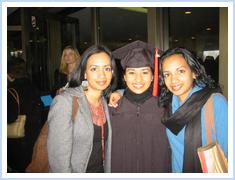 mia Group,
mia Group,
With great Pride, I would like to announce that my youngest sister, Habiba, has successfully Graduated with a B.S. in Bussiness and Accounting from the State University of New York at Plattsburgh on December 17th 2005. I would like to thank you all for your Dua's and Blessing. Please pray for her success in the future!
A picture from her graduation ceremony.
To your left is Tina (the older of the Twins, by 5 minutes :-)), in the center is Habiba and to your right is Gina (the younger of the Twins).
Take care everyone!
With Best wishes - Gina
 mia Group,
mia Group,With great Pride, I would like to announce that my youngest sister, Habiba, has successfully Graduated with a B.S. in Bussiness and Accounting from the State University of New York at Plattsburgh on December 17th 2005. I would like to thank you all for your Dua's and Blessing. Please pray for her success in the future!
A picture from her graduation ceremony.
To your left is Tina (the older of the Twins, by 5 minutes :-)), in the center is Habiba and to your right is Gina (the younger of the Twins).
Take care everyone!
With Best wishes - Gina
Sunday, December 18, 2005
Friday, March 12, 2004
Remembering a First Class gentleman
By Mac Haque
Nina’s mail on the Siyalbukka picnic reminded me that I had somehow mixed up the dates, and yes indeed my father was there. It was the Ramgarh picnic that he missed as he was away in Switzerland, and myself, Nina and Amma were being looked after by Naqui borabba in Chittagong.
Nina as such was already based in Chittagong studying at St.Mary’s School and dad considered it a natural thing to move me and Mum during his absence, because I had by that time picked up a few choice ‘gaaliz’ from the Macchapara kids in Naryanagang, and he feared that in six months time when he would be out of the country, I ‘d be quite a spoilt brat – if I was not one already!
In any case, in Ramgarh we had a cricket match and Akhter ka bowled me out after I had scored only one run, but what I will forever remember was the ride back to Chittagong on Noqui borabba’s Hino Contessa car (at that time the only one in East Pakistan). I’d exploit any opportunity to hitch a ride in that almost ‘noiseless’ Japanese car and I remember telling Babu pahaty excitedly what a fantastic car it was. So it was no surprise that on the way back Pahaty safely tucked himself in the front seat with Munnni while me Chachi amma and Amma were piled in the back set.
Pahaty was a man of very high appreciation for the good life and as soon as we started he went on his customary ‘First Class’ exclamations from way the car accelerated, and the gears were shifted to the brakes – and this went on for a good 45 minutes, till Noqui Borrabba suddenly braked hard when he realised to his horror that the cricket cap he was wearing had been left behind. He was disconsolate as there was a sentimental value attached to it. He had purchased the cap when he first went to see a Pakistan-West Indies test in the Dhaka stadium.
Babu Pahaty however reassured him that somebody will find it and bring it back – and sure enough an hour after when we reached Chittagong somebody in the bus had the cap, and all was fine. Ofcourse Pahaty never forgot to commend the hat wearing it briefly and saying ‘Noqui this is a First Class cap’!
Babu Pahty was a man of impeccable taste, from the dazzlingly clean shirts he wore, to the finely ironed pants or the shining shoes he purchased from EPSI and polished himself (‘no show Maqsood but First Class and they last’), to the way he shaved his face, and his well coiffured hair – he was somebody to emulate.
As time passed we became close and I remember during Sadek ka’s wedding in Chittagong he was all for letting our hair down and having a blast. He would occasionally pop in to the second floor of the house in Kalshi (which we had converted to a discotheque and smoking room) to see the sound system that Sadek ka had managed to bring over from a Chittagonian friend and which we blasted till kingdom come in the 4 days of non-stop partying that went with the marriage. He was curious to a fault, and wanted to know the finer side of this new dancing we called ‘disco’ in those days – also the new Music from the WoodStock festival and the album full of photographs they contained! He had his own idea of entertainment and arranged for an all night quawali session that we all enjoyed.
It was however in Sabuka’s wedding with Narzi that I was in a spot.
On the one hand Kutubda and family with whom I literally grew up with, Saadi, Narzi, Bhaity, Husna and Tanzin insisting that I need to be with them at 'all times', and Babu Pahaty pulling me aside and telling me ever so firmly, "toi kintu dora ghoror – monot rakhibi" – so I ended up making select appearances at both dora and koina ghor without either side ever knowing where my true allegiance lay: until I masterminded the stealing of Sabuka’s wedding shoes!
Babu pahaty as usual as always forgave my prank but we started becoming closer then we were, when he discovered that I had a fascination for politics among other things. We would spend hours discussing the military dictatorship and I realized he was a person who had a finely analytical mind and predicted many things – which I vehemently disagreed with at that time – but now have the proof that he was always …..bang on the nose correct.
He was a man of healthy habits, and when I was confined with typhoid at home for 3 months he would often come by and spend better part of the day, telling me the basic do’s and don’ts. Things like Yogic breathing (which I practise to this day), about the ‘koepin’ or proper use of under garments, and never to get fixated with one brand of toothpaste among others.
Very rarely had I heard of Babu Pahaty being ill, other that a festering sore toe infection, which he made a habit of cleaning, and applying a powder every evening. This had to do something with playing football with boots in his school days and other than him my father suffered the same fate all his life, as did Pahaty …so whenever they both met, several minutes would be spent talking about their foot itch among others!
Yet when father died in 1987, Pahaty was nowhere to be seen. He sent message to me through Pahity that he was disconsolate and if it would be possible for me to go and see him. I did so 2 days later and both of us broke down. It was a private moment, and there was nobody at home, but I can still vividly remember the great strength he gave me by his soothing words of comfort.
Not long after one evening I got disturbing news that Pahaty is not well and has been in the clinic for a few days. I brushed this aside as he was in the Ibn-e-Sina Clinic in 1984 with a stomach and urine ailment, and when he recovered he felt it was an ‘unnecessary thing’ that the family did (i.e. admitting him in a clinic).
The next day after my rehearsals at the hotel Inter Continental, I thought of going over to see Mr.First Class. I called home to Pallabi, but nobody could tell me the name of the clinic.
In any case I decided to drive to Pahaty's in Siddheswari - and in no time I could see an ambulance in front of me headed in the general direction of his house. As I tailed it, sure enough in the back seat of the ambulnace my cars headlight caught what I thought was the silhouette of Pahity – and I was glad Pahaty was returning home.
Parking the car was always a problem near Pahaty’s house, so I decided it keep it inside the compound of my friend Dastagir whose house was just 5 minutes walking distance.
All the while, I was dreaming up some wisecrack to share with Pahaty and Pahity and as I entered the lane, I could see the ambulance pulling out. I was glad Pahaty was home and that I did not have to go and see him in the clinic.
I met Sadek ka at the doorstep and asked him how Pahaty was doing and seeing me in such a jolly mood all he said was ‘Maqsood go in’. Still in jest I said ‘well I hope he is in good health and made his dramatic recovery – which I am sure he has’.
Sadek ka this time was somber – he repeated ‘Maqsood toi bhitorolay jaa’.
Perplexed I walked in – and mentally prepared I may have been for anything – I was not prepared to see my dearv Pahaty covered head to foot in a shroud.
Pahaty the First Class man had departed planet Earth. I was the first Auhomia on the scene, other than the family to have to witness his dead body.
I felt let down - but then what an honourably 'First Class' way to go!
Nina’s mail on the Siyalbukka picnic reminded me that I had somehow mixed up the dates, and yes indeed my father was there. It was the Ramgarh picnic that he missed as he was away in Switzerland, and myself, Nina and Amma were being looked after by Naqui borabba in Chittagong.
Nina as such was already based in Chittagong studying at St.Mary’s School and dad considered it a natural thing to move me and Mum during his absence, because I had by that time picked up a few choice ‘gaaliz’ from the Macchapara kids in Naryanagang, and he feared that in six months time when he would be out of the country, I ‘d be quite a spoilt brat – if I was not one already!
In any case, in Ramgarh we had a cricket match and Akhter ka bowled me out after I had scored only one run, but what I will forever remember was the ride back to Chittagong on Noqui borabba’s Hino Contessa car (at that time the only one in East Pakistan). I’d exploit any opportunity to hitch a ride in that almost ‘noiseless’ Japanese car and I remember telling Babu pahaty excitedly what a fantastic car it was. So it was no surprise that on the way back Pahaty safely tucked himself in the front seat with Munnni while me Chachi amma and Amma were piled in the back set.
Pahaty was a man of very high appreciation for the good life and as soon as we started he went on his customary ‘First Class’ exclamations from way the car accelerated, and the gears were shifted to the brakes – and this went on for a good 45 minutes, till Noqui Borrabba suddenly braked hard when he realised to his horror that the cricket cap he was wearing had been left behind. He was disconsolate as there was a sentimental value attached to it. He had purchased the cap when he first went to see a Pakistan-West Indies test in the Dhaka stadium.
Babu Pahaty however reassured him that somebody will find it and bring it back – and sure enough an hour after when we reached Chittagong somebody in the bus had the cap, and all was fine. Ofcourse Pahaty never forgot to commend the hat wearing it briefly and saying ‘Noqui this is a First Class cap’!
Babu Pahty was a man of impeccable taste, from the dazzlingly clean shirts he wore, to the finely ironed pants or the shining shoes he purchased from EPSI and polished himself (‘no show Maqsood but First Class and they last’), to the way he shaved his face, and his well coiffured hair – he was somebody to emulate.
As time passed we became close and I remember during Sadek ka’s wedding in Chittagong he was all for letting our hair down and having a blast. He would occasionally pop in to the second floor of the house in Kalshi (which we had converted to a discotheque and smoking room) to see the sound system that Sadek ka had managed to bring over from a Chittagonian friend and which we blasted till kingdom come in the 4 days of non-stop partying that went with the marriage. He was curious to a fault, and wanted to know the finer side of this new dancing we called ‘disco’ in those days – also the new Music from the WoodStock festival and the album full of photographs they contained! He had his own idea of entertainment and arranged for an all night quawali session that we all enjoyed.
It was however in Sabuka’s wedding with Narzi that I was in a spot.
On the one hand Kutubda and family with whom I literally grew up with, Saadi, Narzi, Bhaity, Husna and Tanzin insisting that I need to be with them at 'all times', and Babu Pahaty pulling me aside and telling me ever so firmly, "toi kintu dora ghoror – monot rakhibi" – so I ended up making select appearances at both dora and koina ghor without either side ever knowing where my true allegiance lay: until I masterminded the stealing of Sabuka’s wedding shoes!
Babu pahaty as usual as always forgave my prank but we started becoming closer then we were, when he discovered that I had a fascination for politics among other things. We would spend hours discussing the military dictatorship and I realized he was a person who had a finely analytical mind and predicted many things – which I vehemently disagreed with at that time – but now have the proof that he was always …..bang on the nose correct.
He was a man of healthy habits, and when I was confined with typhoid at home for 3 months he would often come by and spend better part of the day, telling me the basic do’s and don’ts. Things like Yogic breathing (which I practise to this day), about the ‘koepin’ or proper use of under garments, and never to get fixated with one brand of toothpaste among others.
Very rarely had I heard of Babu Pahaty being ill, other that a festering sore toe infection, which he made a habit of cleaning, and applying a powder every evening. This had to do something with playing football with boots in his school days and other than him my father suffered the same fate all his life, as did Pahaty …so whenever they both met, several minutes would be spent talking about their foot itch among others!
Yet when father died in 1987, Pahaty was nowhere to be seen. He sent message to me through Pahity that he was disconsolate and if it would be possible for me to go and see him. I did so 2 days later and both of us broke down. It was a private moment, and there was nobody at home, but I can still vividly remember the great strength he gave me by his soothing words of comfort.
Not long after one evening I got disturbing news that Pahaty is not well and has been in the clinic for a few days. I brushed this aside as he was in the Ibn-e-Sina Clinic in 1984 with a stomach and urine ailment, and when he recovered he felt it was an ‘unnecessary thing’ that the family did (i.e. admitting him in a clinic).
The next day after my rehearsals at the hotel Inter Continental, I thought of going over to see Mr.First Class. I called home to Pallabi, but nobody could tell me the name of the clinic.
In any case I decided to drive to Pahaty's in Siddheswari - and in no time I could see an ambulance in front of me headed in the general direction of his house. As I tailed it, sure enough in the back seat of the ambulnace my cars headlight caught what I thought was the silhouette of Pahity – and I was glad Pahaty was returning home.
Parking the car was always a problem near Pahaty’s house, so I decided it keep it inside the compound of my friend Dastagir whose house was just 5 minutes walking distance.
All the while, I was dreaming up some wisecrack to share with Pahaty and Pahity and as I entered the lane, I could see the ambulance pulling out. I was glad Pahaty was home and that I did not have to go and see him in the clinic.
I met Sadek ka at the doorstep and asked him how Pahaty was doing and seeing me in such a jolly mood all he said was ‘Maqsood go in’. Still in jest I said ‘well I hope he is in good health and made his dramatic recovery – which I am sure he has’.
Sadek ka this time was somber – he repeated ‘Maqsood toi bhitorolay jaa’.
Perplexed I walked in – and mentally prepared I may have been for anything – I was not prepared to see my dearv Pahaty covered head to foot in a shroud.
Pahaty the First Class man had departed planet Earth. I was the first Auhomia on the scene, other than the family to have to witness his dead body.
I felt let down - but then what an honourably 'First Class' way to go!

